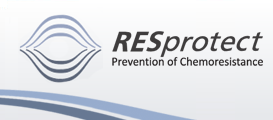| RP101 improves the efficacy of chemotherapy |

|

|

|
|
Fahrig, R., RP101 improves the efficacy of chemotherapy in pancreas carcinoma cell lines and pancreatic cancer patients. Brazilian Journal of Toxicology, Volume 20 (ISSN 1415-2983), Supplement 2, 2007: 9. RP101 ((E)-5-(2-Bromovinyl)-2'-Deoxyuridine, BVDU) which supports apoptosis and prevents the acquisition of chemoresistance, was tested in cultured human pancreatic tumor cells. RP101 down-regulated uridine phosphorylase, a marker of poor prognosis, and APEX1, which is involved in DNA repair, and repressed Stat3 and its target VEGF. Furthermore, RP101 activated antitumor immunity as demonstrated by enhanced cytolytic activity of NK-92 natural killer cells. This was concomitant with an enhanced expression of lymphotoxins alpha and beta, natural killer cell transcript 4 (NK4), tumor necrosis factor LIGHT/TNFSF-14, and ICAM-1 in pancreas carcinoma cells. These results encouraged us to investigate the effect of RP101 in pancreas cancer patients. Here, we present data from two RP101 combination therapy schemes. In a first pilot study, 13 patients being in stage III and VI of disease were treated with gemcitabine (GEM)+cisplatin (CIS)+RP101. RP101 co-treatment enhanced remissions, survival and time to progression (TTP). 77% of the patients lived or have lived longer than one year, and 23% live more than two years. Median survival was 447 days, TTP 280 days, and the response rate 33%. A second study with 21 patients in similar stages of disease, treated with RP101+GEM alone, confirmed the results of the pilot study. 83% of the presently evaluable patients live or lived half a year or longer and 33% one year or longer. Considering both studies, the tumor control was 94%. The data implicated that acquisition of chemoresistance was prevented and the antitumor efficacy of standard chemotherapy was improved. To our knowledge RP101 co-treatment is more efficient than any other regimen published.
|


